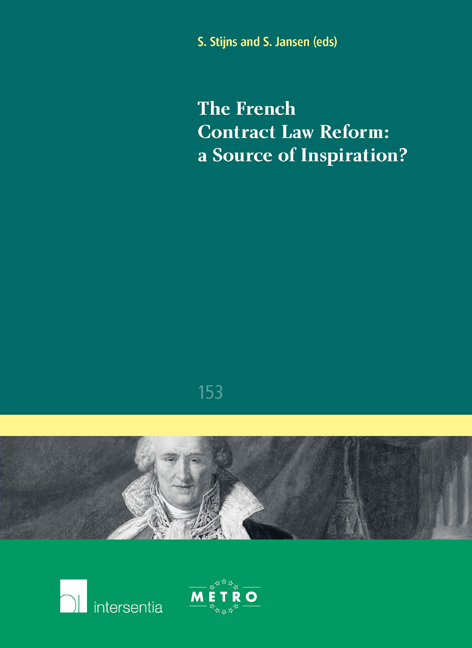Book contents
- Frontmatter
- Contents
- Introduction
- The Reform of the French Law of Obligations: How Long will the Belgians Remain Napoleon's Most Loyal Subjects?
- Pre-Contractual Phase: Reflections on the Attractiveness of the New French Rules for the Parties to International Commercial Transactions
- Nullity in the Ordonnance
- A Tale of Novelty and Continuity: Exploring the Future Judicial Control of Employment Contracts in the French Contract Law Reform
- Introducing Imprévision into French Contract Law - A Paradigm Shift in Comparative Perspective
- Commercial Impracticability and the Missed Opportunity of the French Contract Law Reform: Doctrinal, Historical and Law and Economics Arguments - Comment on Lutzi's Introducing Imprévision into French Contract Law
- Price Reduction under the French Contract Law Reform
- The Measure of Damages in the French Contract Law Reform - Lessons from far more Inspiring Systems
- Set-off in the French Reform of the Law of Obligations: a Tale of Missed Opportunities?
- Fundamental Rights in the French Contract Law Reform
- Miscellaneous Endmatter
Pre-Contractual Phase: Reflections on the Attractiveness of the New French Rules for the Parties to International Commercial Transactions
Published online by Cambridge University Press: 15 December 2017
- Frontmatter
- Contents
- Introduction
- The Reform of the French Law of Obligations: How Long will the Belgians Remain Napoleon's Most Loyal Subjects?
- Pre-Contractual Phase: Reflections on the Attractiveness of the New French Rules for the Parties to International Commercial Transactions
- Nullity in the Ordonnance
- A Tale of Novelty and Continuity: Exploring the Future Judicial Control of Employment Contracts in the French Contract Law Reform
- Introducing Imprévision into French Contract Law - A Paradigm Shift in Comparative Perspective
- Commercial Impracticability and the Missed Opportunity of the French Contract Law Reform: Doctrinal, Historical and Law and Economics Arguments - Comment on Lutzi's Introducing Imprévision into French Contract Law
- Price Reduction under the French Contract Law Reform
- The Measure of Damages in the French Contract Law Reform - Lessons from far more Inspiring Systems
- Set-off in the French Reform of the Law of Obligations: a Tale of Missed Opportunities?
- Fundamental Rights in the French Contract Law Reform
- Miscellaneous Endmatter
Summary
Introduction
This paper addresses the new rules on the pre-contractual phase and reflects upon the following question. To what extent do these rules contribute to the attractiveness of the French law for parties to international commercial transactions?
The ordonnance for the reform of the law of contract, the general regime of obligations, and proof of obligations (the ordonnance) modernises French law. The reform aims inter alia to make the French legal system more influential and attractive at international level. Recent empirical findings on the choice of law applicable to contract have contended, indeed, that French law is not the regime most favoured by parties to international commercial transactions.
The regulation of contractual negotiations, namely Articles 1112, 1112–1, 1112–2, 1123 and 1124 of the ordonnance, is one of the areas subject to modernisation. The provisions established by the Code Napoleon of 1804 were underpinned by the model of simple, discrete transactions and, therefore, did not expressly deal with the contractual negotiations. By contrast, the ordonnance establishes a more sophisticated system of regulation.
This sophistication reflects firstly, the evolution of French case law. Since the adoption of the Napoleonic Code two centuries ago, French courts have come some distance in interpreting its provisions in the context of practical changes. Over the years of application and interpretation of the Code civil, French courts have developed standards of conduct to be respected by the parties during negotiations. The second point underpinning the ordonnance is the complexity of contract formation in practice. Legal scholars, pioneered by the US relational contract theorists at the end of the last century, have described the increasing gap between legal theory and practice. Their arguments have not gone unheard in France. However, many of these legal writings have been criticised for offering few sufficiently pragmatic legislative solutions. Thirdly, the ordonnance draws some inspiration from the existing international soft law instruments.
- Type
- Chapter
- Information
- The French Contract Law Reform: a Source of Inspiration? , pp. 29 - 48Publisher: IntersentiaPrint publication year: 2016



